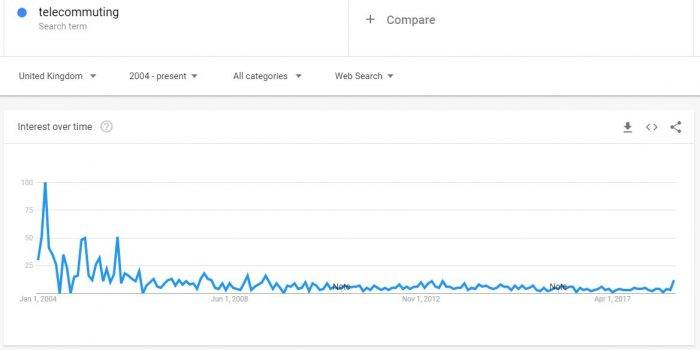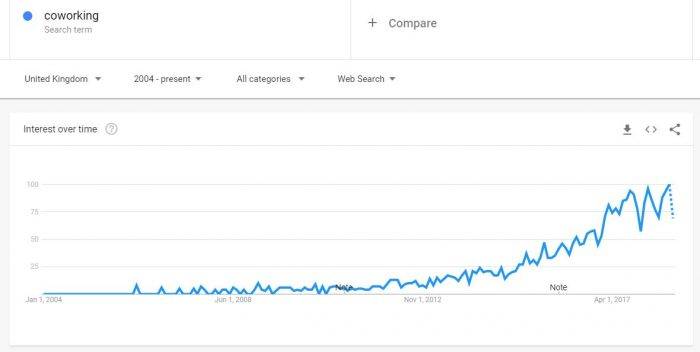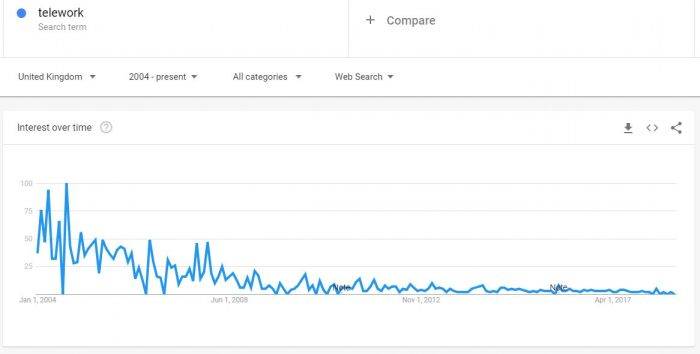September 10, 2018
September 7, 2018
How Thomas Jefferson came to invent the swivel chair and laptop 0
by Mark Eltringham • Comment, Furniture, Technology, Workplace design
 In 1775, Thomas Jefferson was a busy man. As part of the Committee of Five men and at the tender age of 33, he had been charged with drafting the Declaration of Independence that was to be presented to Congress the following Summer. By all accounts, Jefferson was a self-contained and self-sufficient man and, like many great people, a mass of contradictions.
In 1775, Thomas Jefferson was a busy man. As part of the Committee of Five men and at the tender age of 33, he had been charged with drafting the Declaration of Independence that was to be presented to Congress the following Summer. By all accounts, Jefferson was a self-contained and self-sufficient man and, like many great people, a mass of contradictions.
September 6, 2018
Creating a productive workplace for people is all about context
by Mark Eltringham • Comment, Facilities management, Workplace, Workplace design
 The quest for a proper understanding of the links between the places we work, the things with which we fill them and our wellbeing and productivity has been ongoing for a very long time. It predates our current thinking on productive workplace design and the facilities management discipline as we now know it by decades and has its roots in the design of early landmark offices such as Frank Lloyd Wright’s Larkin building and research such as that carried out at the Hawthorne Works in Chicago in the late 1920s. Yet the constantly evolving nature of work means that we are forever tantalised by an idea that we can never fully grasp and makes established ideas seem like revelations.
The quest for a proper understanding of the links between the places we work, the things with which we fill them and our wellbeing and productivity has been ongoing for a very long time. It predates our current thinking on productive workplace design and the facilities management discipline as we now know it by decades and has its roots in the design of early landmark offices such as Frank Lloyd Wright’s Larkin building and research such as that carried out at the Hawthorne Works in Chicago in the late 1920s. Yet the constantly evolving nature of work means that we are forever tantalised by an idea that we can never fully grasp and makes established ideas seem like revelations.
September 4, 2018
Don’t stand so close to me: why personal space matters in the workplace 0
by Paul Goodchild • Comment, Wellbeing, Workplace design
 As successive BCO Specification Guides and the research of organisations like CoreNet Global have proved, the spatial dynamics of offices have changed dramatically in recent years. Put simply, the modern office serves significantly more people per square foot than ever before. Originally this tightening was largely down to the growing ubiquity of flat screen and the mobile devices, but more recently the major driver of change appears to be the gradual disappearance of personal workstations in favour of more shared space.
As successive BCO Specification Guides and the research of organisations like CoreNet Global have proved, the spatial dynamics of offices have changed dramatically in recent years. Put simply, the modern office serves significantly more people per square foot than ever before. Originally this tightening was largely down to the growing ubiquity of flat screen and the mobile devices, but more recently the major driver of change appears to be the gradual disappearance of personal workstations in favour of more shared space.
August 22, 2018
Why early intervention matters for workplace mental health
by Liz Walker • Comment, Wellbeing, Workplace
 Last year alone, poor mental health was the primary cause of long-term absence for 22 percent of organisations, with employees feeling too stressed or anxious to face going in to work. This was up from 13 percent in 2016. However, 45 percent of those who take time off for mental health reasons give their employers another excuse for their absence. Symptoms of mental health can build up when not properly recognised or assessed, but they’re hard to combat when so many employees don’t feel confident enough to open-up about how they’re feeling.
Last year alone, poor mental health was the primary cause of long-term absence for 22 percent of organisations, with employees feeling too stressed or anxious to face going in to work. This was up from 13 percent in 2016. However, 45 percent of those who take time off for mental health reasons give their employers another excuse for their absence. Symptoms of mental health can build up when not properly recognised or assessed, but they’re hard to combat when so many employees don’t feel confident enough to open-up about how they’re feeling.
August 21, 2018
How do you make your company culture work for everyone?
by Jonathan Richards • Comment, Workplace
 Company culture is the bedrock of any business. And it has been thrown into sharp focus in recent months with many high-profile scandals hitting the headlines such as the discrimination case at Uber. In light of this, many businesses are now investing in – even living and breathing – their company culture. This is of course, great news for employees. Shouting about how your company culture is like being part of a family and how everyone mucks in together may have swayed a new recruits’ decision during their interview. However, have you stopped to think how accessible your culture will be to new team members? Close-knit can often translate to the ‘in-crowd’ and office politics can get in the way of a pleasant working environment if the culture is too close.
Company culture is the bedrock of any business. And it has been thrown into sharp focus in recent months with many high-profile scandals hitting the headlines such as the discrimination case at Uber. In light of this, many businesses are now investing in – even living and breathing – their company culture. This is of course, great news for employees. Shouting about how your company culture is like being part of a family and how everyone mucks in together may have swayed a new recruits’ decision during their interview. However, have you stopped to think how accessible your culture will be to new team members? Close-knit can often translate to the ‘in-crowd’ and office politics can get in the way of a pleasant working environment if the culture is too close.
August 16, 2018
The office will always live on because nothing propinks like propinquity
by Mark Eltringham • Comment, Property, Workplace design
 Perhaps the most pervasive and enduring myth about the office is that it is somehow dying off. It’s a blast of guff originally farted out at the dawn of the technological revolution in the early 1990s, which has somehow lingered and been stinking the place out ever since. The essential premise behind the idea of the death of the office is that mobile technology makes it possible for us to work from ‘anywhere’ and so that must mean ‘somewhere’ is no longer needed. (more…)
Perhaps the most pervasive and enduring myth about the office is that it is somehow dying off. It’s a blast of guff originally farted out at the dawn of the technological revolution in the early 1990s, which has somehow lingered and been stinking the place out ever since. The essential premise behind the idea of the death of the office is that mobile technology makes it possible for us to work from ‘anywhere’ and so that must mean ‘somewhere’ is no longer needed. (more…)
August 15, 2018
The global problem of overwork and the right to disconnect
by Aki Stamatis • Comment, Flexible working, Technology, Wellbeing
Anybody who doubts the importance of work and working culture to people’s lives should look at the resistance to President Macron’s mooted changes to labour laws. His attempts to modernise and liberalise French workplace legislation marked the first cracks in his reputation and brought millions of French workers to the streets as part of a national strike.However, one change to French legislation that met with little or no resistance earlier this year was a new right to avoid work emails outside working hours. Under the legislation, firms with more than 50 workers will be obliged to draw up a charter of good conduct, setting out the hours when staff are not supposed to send or respond to emails as they seek a right to disconnect.
August 9, 2018
How will Crossrail impact the office landscape of London and beyond?
by Lars Brown • Comment, Property
 We are now just a few months away from the grand opening of the central section of Crossrail, the 118km long railway line spanning London and the South East which will, once completed, will deliver a direct connection between all of London’s main employment centres; linking Heathrow with Paddington, the West End, the City and Canary Wharf. This ambitious redevelopment plan will bring huge positive change to the City and is estimated to generate over 850,000 new jobs in the Capital, as well as making the lives of those already working in London easier and more efficient.
We are now just a few months away from the grand opening of the central section of Crossrail, the 118km long railway line spanning London and the South East which will, once completed, will deliver a direct connection between all of London’s main employment centres; linking Heathrow with Paddington, the West End, the City and Canary Wharf. This ambitious redevelopment plan will bring huge positive change to the City and is estimated to generate over 850,000 new jobs in the Capital, as well as making the lives of those already working in London easier and more efficient.
August 9, 2018
Is driver behind the widening parental leave gap a lack of rights in the gig economy?
by Sara Bean • Comment, Flexible working, Legal news, News, Workplace
 The already low number of fathers claiming paternity leave has fallen for the first time in five years, to 213,500, down 3 percent from 221,000 last year an analysis by law firm EMW has revealed. To help encourage more men to take paternity leave, the Government launched the shared parental leave scheme in 2015. However, take up of the scheme has also been slow, with less than 2 percent of all UK fathers participating. These latest figures suggest that hundreds of thousands of men are not taking up their entitlement to paternity leave. In comparison with low rates of paternity leave, nearly treble the number of mothers (662,700) took maternity leave in 2017-2018, up from 661,000 in 2016/17. (more…)
The already low number of fathers claiming paternity leave has fallen for the first time in five years, to 213,500, down 3 percent from 221,000 last year an analysis by law firm EMW has revealed. To help encourage more men to take paternity leave, the Government launched the shared parental leave scheme in 2015. However, take up of the scheme has also been slow, with less than 2 percent of all UK fathers participating. These latest figures suggest that hundreds of thousands of men are not taking up their entitlement to paternity leave. In comparison with low rates of paternity leave, nearly treble the number of mothers (662,700) took maternity leave in 2017-2018, up from 661,000 in 2016/17. (more…)
July 31, 2018
How Charles Eames came to have mixed feelings for his most famous chair
by Mark Eltringham • Comment, Furniture, Workplace design
 As any honest smartphone user would attest, the things we own sometimes end up owning us. Equally, the things we create can end up owning us. The most famous item designed by Charles Eames is a moulded plywood, leather upholstered lounge chair and matching ottoman that are timelessly iconic, have spawned thousands of rip-off versions, invariably feature in any anthology of classic Twentieth Century design and are now part of a permanent exhibit at the New York Museum of Modern Art. Yet Eames himself never intended it to go into production in the first place and didn’t even view it as his best product. In an interview in Time magazine he revealed that it was originally designed as a gift for a friend. ‘I made it as a present for Billy Wilder,’ he said. ‘Billy had made a picture in East Germany and found a Marcel Breuer chair and brought it back to me and this was a return present.’
As any honest smartphone user would attest, the things we own sometimes end up owning us. Equally, the things we create can end up owning us. The most famous item designed by Charles Eames is a moulded plywood, leather upholstered lounge chair and matching ottoman that are timelessly iconic, have spawned thousands of rip-off versions, invariably feature in any anthology of classic Twentieth Century design and are now part of a permanent exhibit at the New York Museum of Modern Art. Yet Eames himself never intended it to go into production in the first place and didn’t even view it as his best product. In an interview in Time magazine he revealed that it was originally designed as a gift for a friend. ‘I made it as a present for Billy Wilder,’ he said. ‘Billy had made a picture in East Germany and found a Marcel Breuer chair and brought it back to me and this was a return present.’



































September 12, 2018
Reinventing jobs for an automated future workplace
by Ravin Jesuthasan • AI, Comment, Technology
(more…)